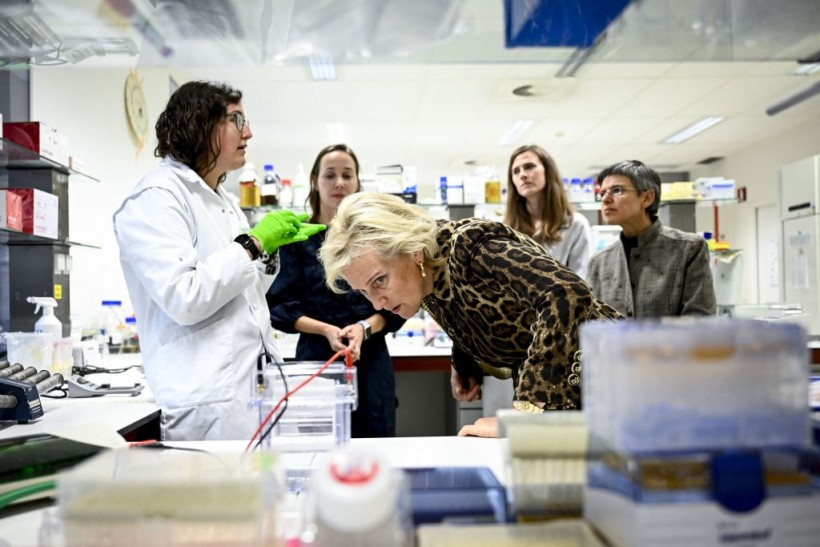According to The Independent, scientists have identified 11 proteins that they say are highly accurate - more than 90 percent - at predicting future dementia. A blood test could predict dementia up to 15 years before diagnosis, research suggests.

Princess Astrid of Belgium closely inspects research work during a royal visit to the laboratory of Professor Rademakers, laureate of the 'Generet 2022' prize of the King Baudouin Foundation, at the Campus Drie Eiken, of the University of Antwerp, in Antwerp, Friday 10 November 2023. Professor Rademakers received the prize for her research into forms of dementia that are less common.
The proteins are found in the liquid component of blood known as the plasma and are markers for the biological changes that occur in those who have dementia or Alzheimer's disease.
One such protein, GFAP, has previously been identified as a potential biomarker in smaller studies.
The researchers from the University of Warwick and Fudan University in China described their findings, published in Nature Aging, as a "breakthrough."
Professor Jianfeng Feng, from the University of Warwick's Department of Computer Science, said this test "could be seamlessly integrated into the NHS and used as a screening tool by GPs."
Scientists say that an early diagnosis is crucial for those with the condition as there are new drugs to slow down the progression of the disease if detected early enough.
Jia You of Fudan University said early screening "holds immense significance in pinpointing dementia risks."
He said, "A notable advantage of plasma protein analysis is that it merely necessitates routine blood tests, similar to those conducted during regular hospital visits or health checks.
"This simplicity offers a considerable edge over more invasive procedures like lumbar punctures, especially where the targeting population are healthy individuals."
Who Will This Potentially Affect?
The Guardian reported more than 55 million people live with dementia worldwide, a figure expected to reach 78 million by 2030. About 70% of all dementia is caused by Alzheimer's disease, with vascular dementia caused by blood vessel damage, making up 20% of cases.
"We hope to develop this as a screening kit that can be used in the NHS," said Prof Jianfeng Feng.
Confirming the disease early is critical if patients are to benefit from two new Alzheimer's drugs, lecanemab and donanemab, which are under review by the UK medicines regulator.
The US medicines regulator, the Food and Drug Administration, has approved lecanemab and is expected to rule on donanemab imminently. European regulators are still reviewing both drugs.
Since lecanemab, a synthetic antibody therapy created by Biogen in the US and Eisai in Japan, made headlines in 2022 for slowing Alzheimer's, doctors and medical charities have warned that the health service is not ready to deliver such drugs, said The Guardian.
Work is progressing to develop and offer simple blood tests to diagnose the disease, but researchers say that challenges remain even with a quick diagnosis. The new drugs must be infused into patients every two weeks, and there are fatal side effects. Patients would need regular MRI scans to check for brain swelling or bleeding.
While talks with several companies to develop the test are still in its early stages, the cost, currently at several hundred pounds, would need to decrease to make it viable.
For the latest study, blood samples from 52,645 UK adults without dementia were collected and frozen between 2006 and 2010 and analyzed 10 to 15 years later. More than 1,400 participants went on to develop dementia.
Using artificial intelligence, the researchers looked for connections between nearly 1,500 blood proteins and developing dementia years later.
Dr. Sheona Scales, the director of research at Alzheimer's Research UK, said: "This new study adds to the growing body of evidence that looking at levels of certain proteins in the blood of healthy people could accurately predict dementia before symptoms develop."
Scales added, "Even when tests show promise in studies like this, they still need to go through regulatory approval before they can be used in a healthcare setting.
"Blood tests are showing great promise, but so far none have been validated for use in the UK. In collaboration with the Alzheimer's Society, NIHR, and with generous funding from players of People's Postcode Lottery, we are in the process of funding research to provide the evidence the NHS would need to move forward with blood tests to diagnose Alzheimer's disease."









